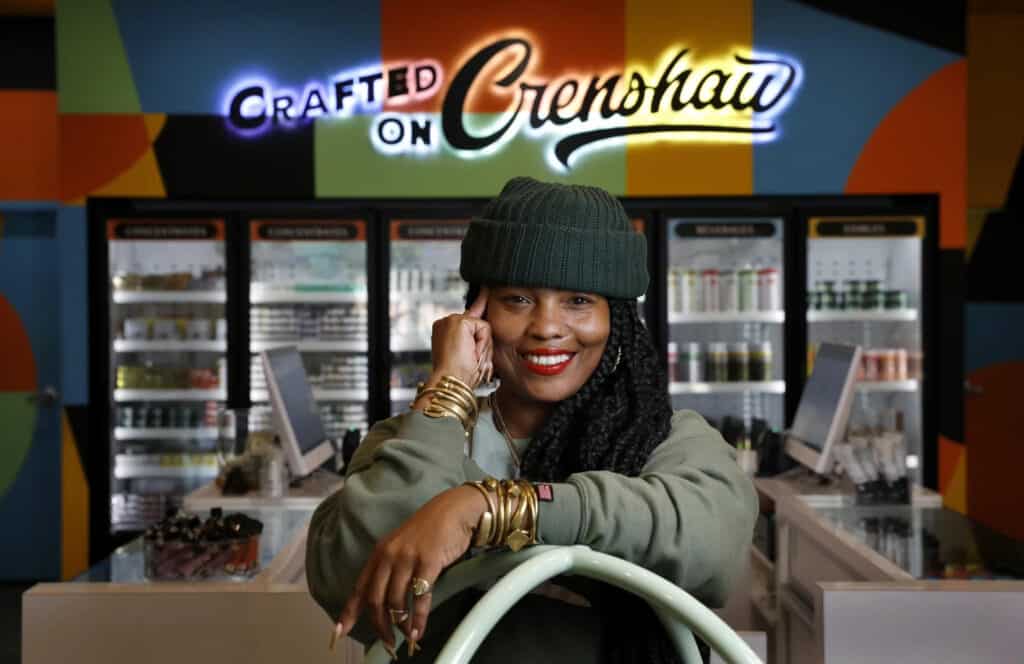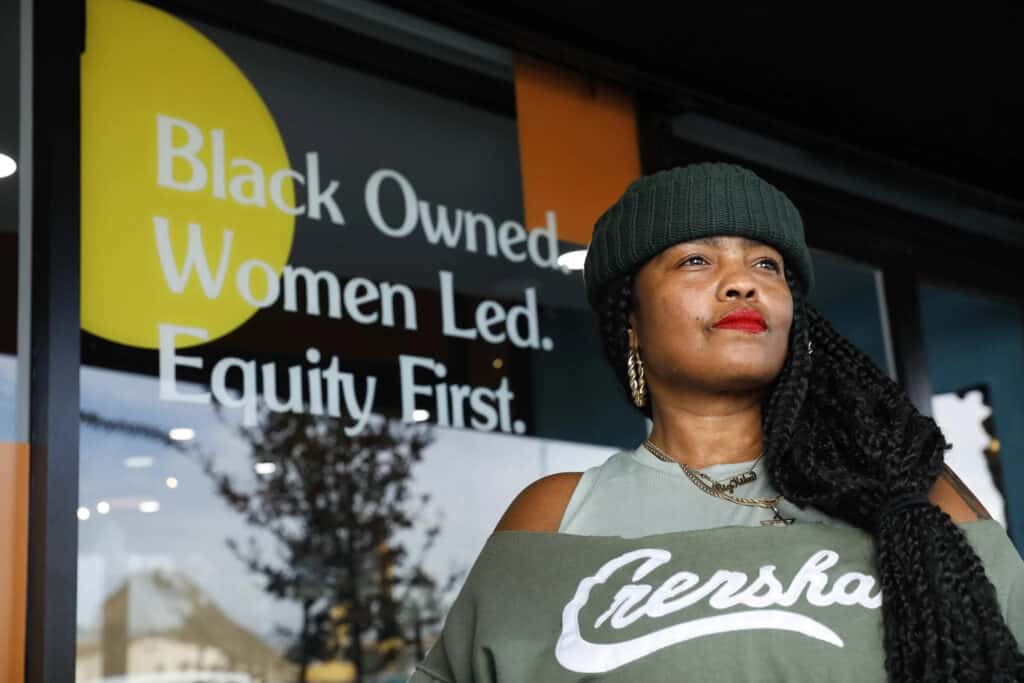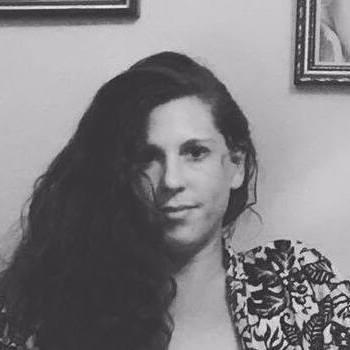When Kika Keith first applied for the Los Angeles social equity program, she thought she was going to start a dispensary, not a battle. But in the wake of L.A.’s infamous failure to create a just system for social equity applicants, Keith found herself leading the charge against an entrenched system of wealth inequality. But as hard as she fought to open L.A.’s first black woman-owned dispensary, Gorilla Rx Wellness, she also relished the historic opportunity to stand up for what’s right.
“I want to show that we can hold them accountable for giving us a position we should have in every other industry,” she says. “And that’s what makes it fun—when you think about Harriet Tubman and Sojourner Truth, you are able to find the joy in it.”
Keith’s road to cannabis entrepreneurship began with Gorilla Life, a chlorophyll wellness drink made from her mother’s secret recipe. “My mother created it for my eldest daughter who had asthma really bad,” she says. “One day we were in Children’s Hospital, and my mother brought in this drink with chlorophyll and lemon, sweetened with honey.” The dramatic improvement in her daughter’s health got Keith thinking. At the time the music academy she was running in her South Central neighborhood was strapped for cash, and she had been considering adopting Paul Newman’s model. “I wanted a for-profit to fund my nonprofit,” she says, and so Gorilla Life was born.
Initially, Keith thought the perfect place to sell the beverage would be the dispensaries beginning to proliferate throughout the city. She had grown up seeing the wellness link between cannabis and plant-based diets, and knew Gorilla Life would be a natural fit in the world of medical cannabis. “We were vegetarians in the 70s—I was always taught what you need comes from the earth,” she says. “My dad was Rastafarian, so cannabis was always around.” Dispensaries responded enthusiastically to her overtures, and one even suggested infusing her drink with hash and calling it Chronic Tonic.
But in 2008, Whole Foods agreed to carry Gorilla Life, turning Keith’s attention away from cannabis. For the next ten years, she grew her brand from the ground up, working out the details of manufacturing, marketing, and national distribution as she went. “All along I was getting a great education,” she says. Part of this education included learning to stay true to her original vision and decline investments from those who asked her to change it. “I promised my mom that I would never compromise the integrity of her recipe,” Keith says. “I probably sat in front of 30 investors over those ten years, and every single one wanted me to compromise.”
By 2017, she was ready for something different, and once again heard the call of cannabis. Black politicians were urging the people of South Central to come into the cannabis space while it was still growing to make sure they weren’t shut out from yet another industry. Inspired, Keith decided to apply for a social equity license so she could open her own dispensary; immediately she took a hiatus from Gorilla Life to devote herself single-mindedly to all things cannabis. “I went to Oaksterdam, went to city and state advisory meetings, and immersed myself in the political process,” she says.
Despite Keith’s initial excitement, she soon soured on a program that she realized had no real investment in her success. Though they were offering 100 social equity licenses, candidates were on their own when it came to capital. “In 2018, the city of LA had $10 million allocated to social equity, but a few months into the program it was re-budgeted to police enforcement,” she says with a sigh. “I sat there thinking, this damn program is designed to fail. They’re setting my people up.”
But Keith wasn’t raised to accept such realizations as defeat. “My parents are community activists,” she says, “so I had a higher obligation. As soon as I figured out what was going on I started organizing.” Noting that the information applicants needed was being delivered at meetings that took place in the middle of a working person’s day, she took notes to share with those unable to attend. When she saw that no social equity candidates were represented at city and state meetings, Keith raised money to hire buses to get her people to city hall. But it still wasn’t enough—participation in the political process did not appear to be an avenue to change a predetermined outcome. “Even though we made all these efforts they had already made their decision on the votes. The well-resourced did not want social equity stores to open up.”
As the political process dragged on, the rents applicants were forced to pay on their commercial properties drained people’s life’s savings. “I knew a mother and daughter who sold a house they inherited from their grandmother to buy two commercial properties,” she says. “Their place was foreclosed on, and they had to take a predatory deal.” Keith grew more determined to fight back with every injustice she witnessed. Like the others, Keith was hemorrhaging money waiting for the social equity program to come through, and she decided that as long as she was paying for a space she may as well make it the resistance headquarters. She held meetings, passed out information, and even rented laptops so people could come fill out their applications together.
This last decision proved to be pivotal for her growing movement. Since the applications were to be given out on a first come, first serve basis, Keith feared the servers would crash after being flooded with applications. With the laptops she rented, she had everyone record the process so that she could prove the timestamp for their application, which inadvertently led to her recording the time stamp for applicants whose applications were let in 10 minutes early. “I certainly did not think the miscarriage of justice would be so blatant,” she says. Armed with the evidence, the applicants filed a lawsuit and won an additional 100 social equity licenses. Keith was the first of the licensees to open her doors.

Today, Keith is the proud owner of Gorilla Rx Wellness, the dispensary of her dreams. The warm lighting and friendly decor were designed to make people feel welcome and unafraid to ask questions. “I wanted it to feel as welcoming as my grandmother’s house,” she says. Located eight blocks from where she grew up, the dispensary has 30 employees—the vast majority are also from the neighborhood—and she is delighted to offer a prominent selection of Black and brown brands. When she looks around her colorful store, Keith knows the long fight for equity in Los Angeles was worth it. “It’s important to show the beauty and potential of what’s happening,” she says. “There is a great opportunity right now for us to band together and really form an economic community, because the market is limitless right now.” For her, the future belongs to those who claim their place in it, even when the odds aren’t in their favor.
“If we transfer the power to ourselves and stand in that power, we’re in a position like no other time in history for a new industry,” she says. “We want to be a voice to say you don’t have to compromise. You can stand your ground, and create a new model, and get back to the heart of cannabis that has been lost.”
Kika Keith will be speaking at MJ Unpacked New York on “Building and protecting the craft cannabis ecosystem.”






2 thoughts on “Kika Keith on reclaiming power and building the dispensary of her dreams in LA”
Pingback: Mixed reviews for California social equity programs - MJ Brand Insights
Pingback: Top ten hottest woman-led cannabis brands - MJ Brand Insights